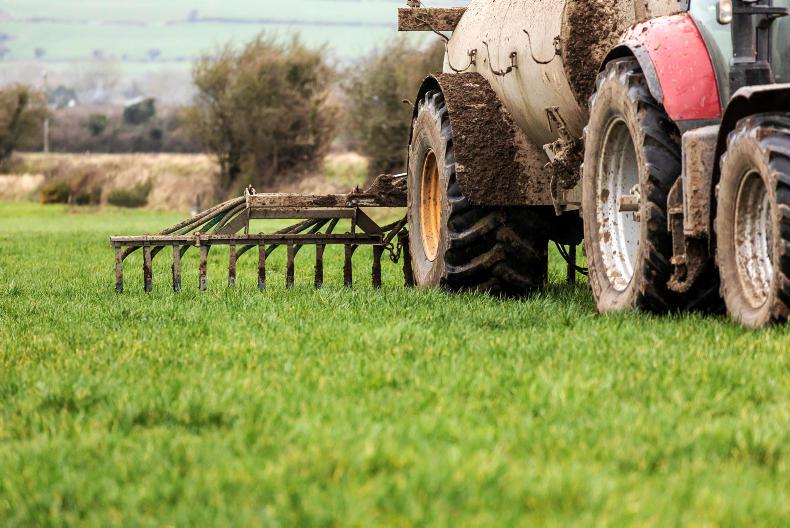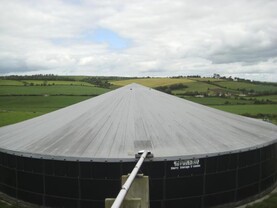More measures are needed to cut ammonia emissions and the new CAP will have a crucial role to play in incentivising member states to reduce air pollution in the agricultural sector, a European Commission report has said.
Its report on the second clean air outlook has said that almost all member states need to increase their efforts to reduce emissions to comply with emissions reduction obligations for 2030, highlighting ammonia emissions in particular.
“The measures that would cut ammonia emissions in the most cost-efficient manner all relate to agriculture and are, to a large extent, related to animal feeding practices, manure management and use of fertilisers,” the Commission said.
Pollution control programmes
“Ammonia emissions from agriculture remain an outstanding issue in all the cases analysed in this report, and the additional measures announced by member states in their national air pollution control programmes (NAPCPs) need to be implemented without delay to reduce these emissions, and even more measures need to be introduced in many member states," the report said.
“More than 90% of ammonia emissions in the EU come from agriculture, notably from livestock farming and from the storage and use of organic and inorganic fertilisers.”
CAP
The Commission has said that the new CAP needs to play its part in supporting and contributing to the reduction of air pollution.
It called on member states to harness the new opportunities provided by the proposed eco schemes in the national strategic plans and the proposed strategic objectives, including management of natural resources such as air and water.
Farmers
A CAP with strong environmental and climate ambitions should be pursued in order to reflect the priorities under the European green deal the Commission said, in line with the farm to fork and biodiversity strategies.
“In parallel, the Commission will continue to help member states by developing more guidance and technical support for farmers and national institutions on how to implement well-known and cost-effective measures to reduce air pollution and by exploring innovative ways to reduce air pollutant emissions in agriculture.
“This should be done in an integrated way, taking into account pollution to air, water and soil, as well as climate impacts, in line with what will be endeavoured for all sectors through the European green deal’s zero pollution ambition,” it said.
Read more
The challenges of ammonia loss from agriculture
Stark NI ammonia study published
More measures are needed to cut ammonia emissions and the new CAP will have a crucial role to play in incentivising member states to reduce air pollution in the agricultural sector, a European Commission report has said.
Its report on the second clean air outlook has said that almost all member states need to increase their efforts to reduce emissions to comply with emissions reduction obligations for 2030, highlighting ammonia emissions in particular.
“The measures that would cut ammonia emissions in the most cost-efficient manner all relate to agriculture and are, to a large extent, related to animal feeding practices, manure management and use of fertilisers,” the Commission said.
Pollution control programmes
“Ammonia emissions from agriculture remain an outstanding issue in all the cases analysed in this report, and the additional measures announced by member states in their national air pollution control programmes (NAPCPs) need to be implemented without delay to reduce these emissions, and even more measures need to be introduced in many member states," the report said.
“More than 90% of ammonia emissions in the EU come from agriculture, notably from livestock farming and from the storage and use of organic and inorganic fertilisers.”
CAP
The Commission has said that the new CAP needs to play its part in supporting and contributing to the reduction of air pollution.
It called on member states to harness the new opportunities provided by the proposed eco schemes in the national strategic plans and the proposed strategic objectives, including management of natural resources such as air and water.
Farmers
A CAP with strong environmental and climate ambitions should be pursued in order to reflect the priorities under the European green deal the Commission said, in line with the farm to fork and biodiversity strategies.
“In parallel, the Commission will continue to help member states by developing more guidance and technical support for farmers and national institutions on how to implement well-known and cost-effective measures to reduce air pollution and by exploring innovative ways to reduce air pollutant emissions in agriculture.
“This should be done in an integrated way, taking into account pollution to air, water and soil, as well as climate impacts, in line with what will be endeavoured for all sectors through the European green deal’s zero pollution ambition,” it said.
Read more
The challenges of ammonia loss from agriculture
Stark NI ammonia study published






 This is a subscriber-only article
This is a subscriber-only article











SHARING OPTIONS: